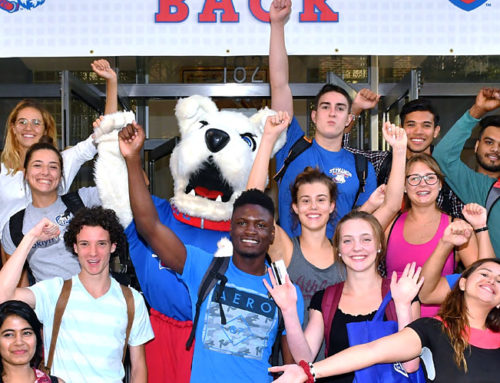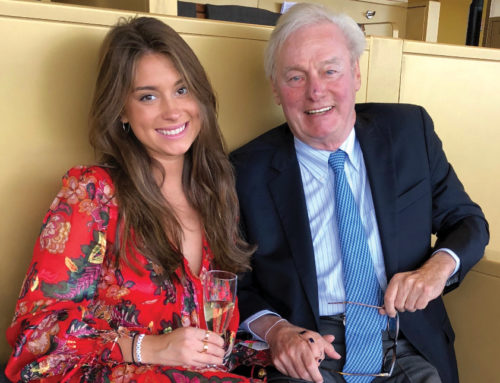Alumni Spotlight
Patricia Darragh ’79, Business Major
Executive Director (ret.), California Olive Oil Council
After graduating from St. Francis College in 1979, Patricia Darragh began what would be the first of two long, successful careers.
In her first, with American Airlines, Queens-born, Brooklyn-raised Patricia supervised flight attendants on international routes, working out of JFK Airport in New York City.
Following a move to California in the late ’90s, Patricia embarked on career number two: a long turn with the California Olive Oil Council (COOC), eventually as its Executive Director. The COOC is a trade association with the mission of encouraging the consumption of certified California extra virgin olive oil through education, outreach and communications.
During Patricia’s tenure there, the COOC strengthened and codified standards for California-produced olive oil, ensuring consumers know when they are purchasing the best possible product from that state. After 20-plus years with the Council, Patricia retired late last year.
Patricia recently reflected on her years at St. Francis College and the unique professional path she took after.
Looking back at your St. Francis College career, what professors or courses were instrumental to your success?
Everyone was so nurturing and so supportive. Whether it was an administrator, staff [member] or the professors.
But my all-time favorite professor… was Nicholas Fiorenza. He taught French, but also art and music… I took both of those courses with Professor Fiorenza, and he was incredibly supportive, incredibly enthusiastic, and he really opened up my eyes to culture and art and music… areas that I had not been exposed to at all.
One day, [Professor Fiorenza] played a piece from the Italian soprano Amelita Galli-Curci. It was absolutely stunning… it was just a wonderful moment of feeling that I was really grasping culture from an angle… that I was really not exposed to in day-to-day life.
What did you take away from your St. Francis College years that informed your post-collegiate life?
My great takeaway from my years at St. Francis was the fact that I was so well supported as a student, as a person, and that I gained so much confidence during my tenure there.
Basically, I’m an introvert. I was always a very shy child… My experience at St. Francis College reinforced my feelings about my ability to get things done and do things successfully.
I just always dreamed of graduating from a four-year college. I was the first one in my family to do so… I honestly didn’t have the self-confidence when I first started that I’d be able to do it. It’s a wonderful feeling to have a sense of community and people who really care.

Patricia Darragh ’79 with Hugo
You worked twenty years at American Airlines, starting when you were an undergraduate. What was that like?
My primary career was in flight service. I went through flight attendant training in the late 70s. Then went right into the supervisory program. For ten years plus, I was a supervisor for international flight service at JFK. I took early retirement [from American Airlines] in 1988.
You also pursued your culinary passions during that time?
By the time I got into my late twenties, there were a lot of things happening in the food world. James Beard, Gourmet magazine, I think Bon Appetit magazine came at that time. I became very interested in elevating my culinary skills.
When I was working for American Airlines, I had access to free travel. I took several cooking classes and also a certificate program [in Paris]. So I have credentials from La Varenne, which is a cooking school in Paris, and also Cordon Bleu, which I think was the first and probably the most famous cooking school in Paris. Whenever I could, I would take various [cooking] courses.
You moved with your family to northern California in 1997. How did you get involved with the Olive Oil Council?
I met a woman who told me her husband had just been elected president of the California Olive Oil Council. I ended up having coffee with him and he hired me that day.
My first role was a very part time position as a publicist. I was getting my feet wet working about four to six hours a week. Then I [started] meeting with the Council’s volunteer board of directors. I would say, “you don’t have a website and you don’t have emails set up.” My role there grew.
That year [1997], we established the first sensory panel for olive oil in the Western hemisphere. [Note: an olive oil sensory panel is a group of professionals trained to evaluate objectively the aroma and flavor of olive oil, as part of the certification process.]
The Council also established very strict standards for extra virgin olive oil. We started the Seal Certification Program, which is a multi-step program that producers must adhere to in order to put “Extra Virgin” and the California Olive Oil Council seal on their bottle and marketing.
Why did this line of work appeal to you?
When I was offered the job, the Council was focused on quality and establishing vigorous [industry] standards. And that appealed to me. I like the idea of quality. I did feel in some areas of food that there was a lot of mislabeling. That is really the cornerstone of the Council today. To ensure that consumers and retailers buy a product that meets a standard and that the labels are very clear.
Also, the fact that extra virgin olive oil is just such an important component of making good food and that it’s healthy. It’s the healthiest fat that there is. I also found that learning about agriculture was very appealing to me. At that time and even to some extent today, women are not in large numbers in agriculture. So I found that very interesting.
Because people are staying at home right now, many are cooking more than they would normally. What advice can you share about using olive oil?
It is fantastic in making desserts. When I make pound cake for example, I do not use other fats… I use extra virgin olive oil. Any [baked dessert] where there’s melted butter or any kind of oil, substitute extra virgin olive oil because it will make your cake moister, and it’ll also add volume. [Patricia recommends this chocolate olive-oil cake recipe.]
But the key with olive oil is you really need to have fresh olive oil. Olive oil has a lifespan of 24 months, At the Council, we recommended 18 months because it’s basically a fruit juice and it is not shelf stable. You should use it as quickly as possible and store it away from the stove. Put it in a dark cupboard.
Note: Find more olive oil tips at the California Olive Oil Council website.
Any advice for our current St. Francis College student just starting out on careers?
Try to be as fearless as possible. There really is no such thing as failure. Even in “failing” we realize something about ourselves or others.





